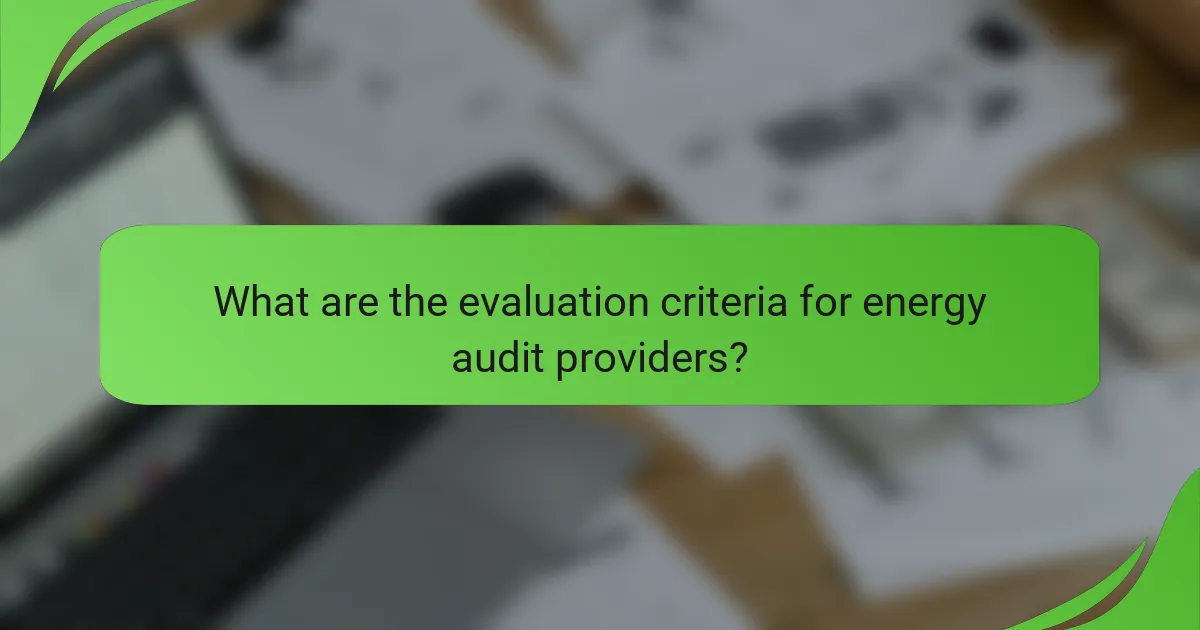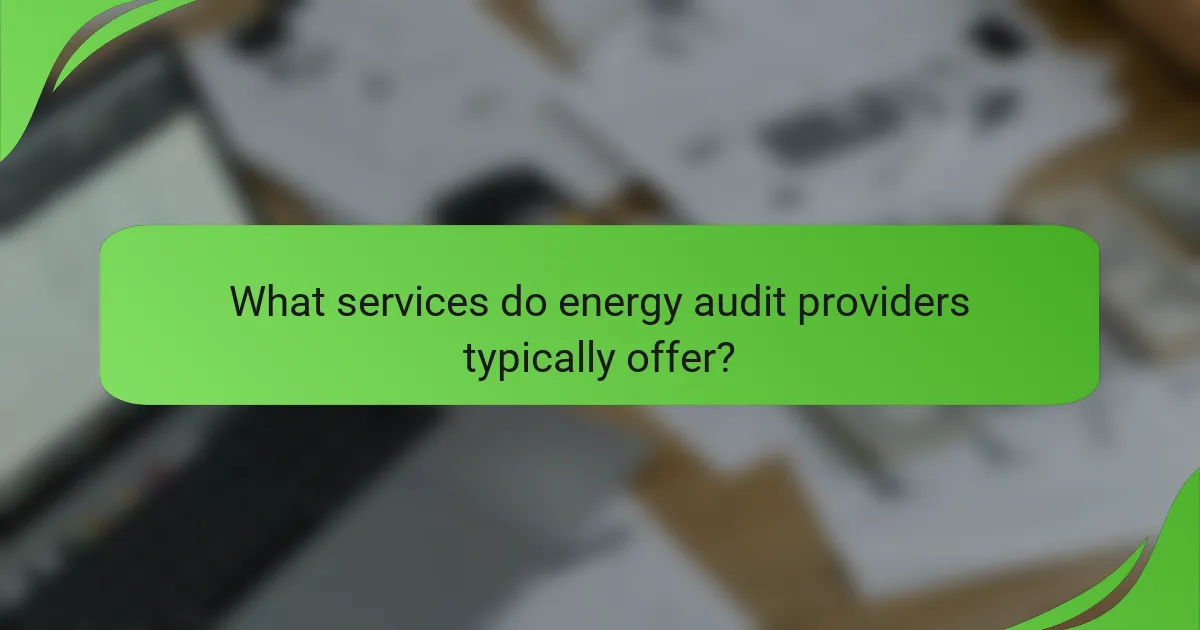When selecting an energy audit provider, it’s essential to evaluate their experience, service offerings, and customer feedback to ensure a comprehensive and effective audit. Consider factors such as compliance with local regulations and the technology they employ, as these elements contribute to the quality of service you can expect. Additionally, be aware that the average cost of energy audits varies, typically ranging from $300 to $800, depending on property type and audit scope.

What are the evaluation criteria for energy audit providers?
When selecting energy audit providers, consider criteria such as their experience, service offerings, client feedback, compliance with local regulations, and the technology they utilize. These factors help ensure the provider can deliver a thorough and effective audit tailored to your needs.
Experience and certifications
Experience is crucial when evaluating energy audit providers. Look for firms with several years in the industry and relevant certifications, such as those from the Association of Energy Engineers (AEE) or the Building Performance Institute (BPI). These credentials indicate a level of expertise and adherence to industry standards.
Additionally, consider the provider’s track record with projects similar to yours. A provider with experience in your specific sector, whether residential, commercial, or industrial, is more likely to understand your unique challenges and requirements.
Service offerings and scope
Different energy audit providers offer varying scopes of services. Some may focus solely on energy consumption analysis, while others provide comprehensive solutions that include recommendations for energy efficiency upgrades, financial analysis, and ongoing monitoring. Assess your needs to find a provider that aligns with your objectives.
Inquire about the specific methodologies they use, such as walkthrough audits, detailed energy modeling, or diagnostic testing. A provider that offers a range of services can better address your energy efficiency goals.
Client reviews and testimonials
Client reviews and testimonials are valuable indicators of a provider’s reliability and service quality. Look for feedback on platforms like Google Reviews or industry-specific forums. Positive reviews often highlight the provider’s professionalism, thoroughness, and ability to deliver actionable insights.
Consider reaching out to past clients for direct feedback. This can provide a clearer picture of the provider’s strengths and weaknesses, helping you make a more informed decision.
Compliance with local regulations
Energy audit providers must comply with local regulations and standards, which can vary significantly by region. Ensure that the provider is familiar with the relevant laws and guidelines in your area, such as energy efficiency codes or utility incentive programs.
Compliance not only ensures that the audit meets legal requirements but also maximizes potential rebates or incentives available for energy improvements. Ask the provider about their experience with local regulations to gauge their expertise.
Technology and tools used
The technology and tools used by energy audit providers can significantly impact the quality of the audit. Providers should utilize advanced software for energy modeling, data analysis, and reporting. Tools like thermal imaging cameras and blower doors can provide detailed insights into energy loss areas.
Inquire about the specific technologies the provider employs and how they enhance the audit process. A provider that stays updated with the latest tools is likely to deliver more accurate and actionable results.

How to choose the right energy audit provider in the US?
Choosing the right energy audit provider in the US involves evaluating their qualifications, service offerings, and customer support. Focus on providers with relevant certifications, comprehensive services, and responsive support to ensure a thorough and effective audit.
Assessing provider qualifications
Start by checking the provider’s certifications, such as those from the Building Performance Institute (BPI) or the Residential Energy Services Network (RESNET). These credentials indicate that the provider meets industry standards and has undergone rigorous training.
Additionally, consider their experience in the field. A provider with several years of experience and a strong track record is likely to deliver more reliable results. Look for customer testimonials or case studies that highlight their expertise.
Comparing service packages
Energy audit providers typically offer various service packages, ranging from basic assessments to comprehensive evaluations. Basic packages may include a walkthrough audit, while more extensive options might involve detailed energy modeling and recommendations for improvements.
When comparing packages, look for services that align with your specific needs. For instance, if you are interested in energy efficiency upgrades, ensure the package includes detailed recommendations and potential cost savings. Request quotes to understand the price differences between packages.
Evaluating customer support
Effective customer support is crucial when selecting an energy audit provider. Assess their availability for consultations and follow-up questions after the audit. A responsive provider can help clarify findings and guide you through the implementation of recommendations.
Check if they offer additional resources, such as online tools or educational materials, to assist clients post-audit. Strong customer support can enhance your overall experience and ensure you maximize the benefits of the energy audit.

What is the average cost of energy audits in major US cities?
The average cost of energy audits in major US cities typically ranges from $300 to $800, depending on the type of property and the scope of the audit. Residential audits tend to be less expensive than commercial ones, reflecting the differences in complexity and requirements.
Cost range for residential audits
Residential energy audits usually cost between $300 and $500. This price range often includes a comprehensive evaluation of the home’s energy use, insulation, and HVAC systems. Some utility companies may offer rebates or incentives that can reduce the overall cost.
For larger homes or those requiring more detailed assessments, costs can rise to around $600. Homeowners should consider the potential savings on energy bills when evaluating the cost of the audit.
Cost range for commercial audits
Commercial energy audits generally range from $1,000 to $5,000, depending on the size and complexity of the facility. Larger buildings or those with specialized systems may incur higher costs due to the need for advanced analysis and reporting.
Some commercial audits can be more extensive, potentially exceeding $10,000, particularly if they involve multiple buildings or require extensive data collection and analysis. Businesses should weigh these costs against potential energy savings and efficiency improvements.
Factors influencing pricing
The experience and qualifications of the auditor also play a significant role in determining the price. Auditors with certifications or specialized training may charge more, but they often provide more thorough evaluations and actionable recommendations.
Additionally, the availability of state or local incentives can affect overall costs. Homeowners and businesses should research available rebates to help offset the expense of an energy audit.

What services do energy audit providers typically offer?
Energy audit providers typically offer a range of services designed to evaluate and improve a building’s energy efficiency. These services often include comprehensive energy assessments, building performance testing, and tailored energy efficiency recommendations.
Comprehensive energy assessments
Comprehensive energy assessments involve a detailed analysis of a building’s energy consumption patterns and systems. Providers often use tools like energy modeling software to simulate energy use and identify inefficiencies.
During these assessments, auditors may review utility bills, inspect HVAC systems, and evaluate insulation levels. This thorough approach helps pinpoint areas where energy savings can be achieved, often resulting in recommendations that can lower utility costs by a significant percentage.
Building performance testing
Building performance testing measures how well a building operates in terms of energy efficiency. This may include blower door tests to assess air leakage and thermographic inspections to identify thermal bridging or insulation gaps.
These tests provide quantifiable data on a building’s performance, allowing auditors to recommend specific improvements. For instance, sealing leaks can lead to better temperature control and reduced heating and cooling costs.
Energy efficiency recommendations
Energy efficiency recommendations are tailored suggestions based on the findings from the assessments and tests. These may include upgrades to more efficient lighting, HVAC systems, or insulation materials that comply with local energy codes.
Implementing these recommendations can lead to substantial energy savings over time. For example, switching to LED lighting can reduce energy consumption by up to 75% compared to traditional bulbs. It’s essential to prioritize recommendations based on cost-effectiveness and potential return on investment.

What are the benefits of conducting an energy audit?
Conducting an energy audit provides significant advantages, including identifying inefficiencies and opportunities for cost savings. By evaluating energy consumption, businesses and homeowners can implement strategies that lead to reduced energy bills and improved overall comfort.
Cost savings on energy bills
One of the primary benefits of an energy audit is the potential for substantial cost savings on energy bills. Audits help pinpoint areas where energy is wasted, allowing for targeted improvements such as upgrading insulation, sealing leaks, or replacing inefficient appliances.
For instance, many households can save anywhere from 10% to 30% on their energy bills after implementing recommendations from an energy audit. Simple changes, like switching to LED lighting or optimizing heating and cooling systems, can lead to noticeable reductions in monthly expenses.
Improved building comfort
Energy audits not only save money but also enhance the comfort of a building. By identifying issues such as drafts, poor insulation, or inadequate heating and cooling systems, audits provide a roadmap for creating a more comfortable living or working environment.
For example, sealing air leaks and improving insulation can help maintain consistent temperatures throughout a home, reducing cold spots in winter and excessive heat in summer. This not only increases comfort but can also improve indoor air quality, making spaces healthier for occupants.
